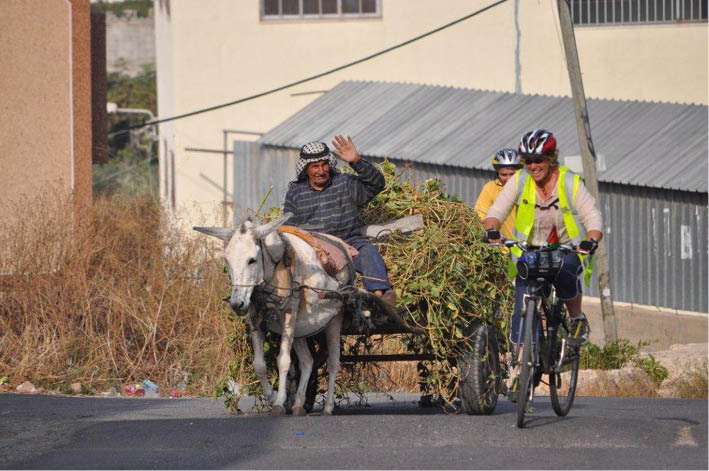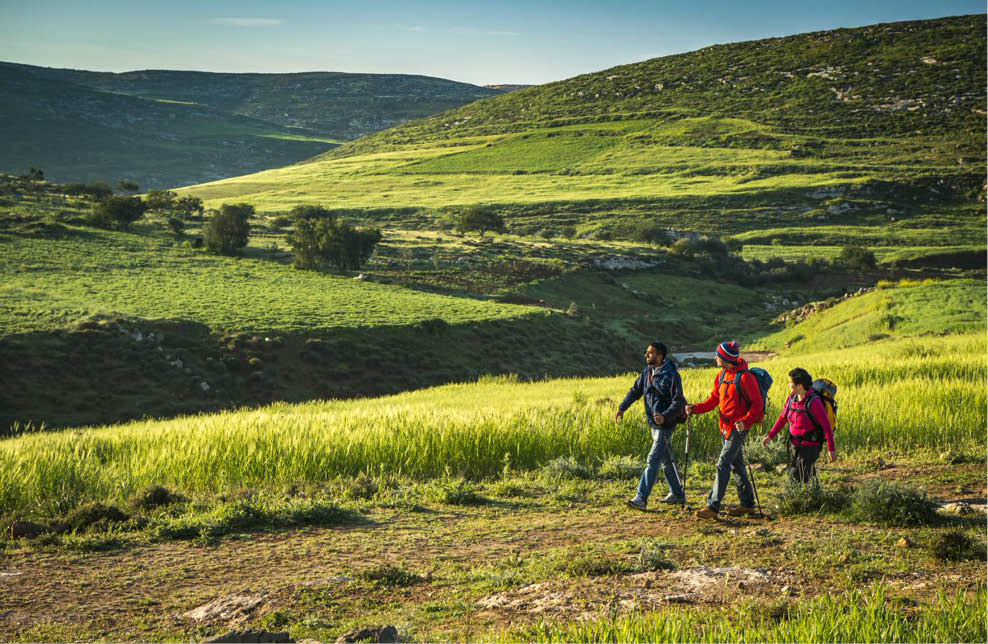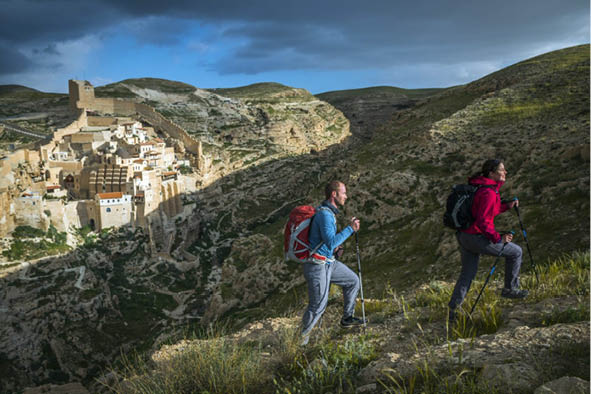As with all tourism sectors worldwide, the COVID-19 pandemic has disrupted experiential tourism in Palestine. Since March 2020, all hiking and biking programs in Palestinian have been suspended. Host families, guesthouses, hotel and service providers, and tour guides have lost hundreds of opportunities to host or guide international visitors, as travel restrictions have made it difficult for international visitors to come to Palestine. But according to international tourism indicators, experiential tourism and outdoor activities will be the products most in demand by post-pandemic travelers. They will find a great offering in Palestine.
In recent years, travelers’ attitudes and demands have changed, prompting the development and refining of Palestinian tourism offerings based on visitors’ specific requests and expectations. Tourism capacity was increased for nature lovers who like to explore ancient history, culture, and religion in a unique way, whether on foot or on two wheels. Boosting the socio-economic development of rural communities was the way to move forward, thus, the heritage of walking was being kept alive with a modern twist, giving it new meaning and purpose. Walking, hiking, and cycling in Palestine are enjoyable and mean more than mere physical activity, providing opportunities for a deeper appreciation of authentic Palestinian hospitality.

Palestine offers a variety of walking options that satisfy the diverse demands of modern travelers, whether they seek spirituality, adventure, or nature-related experiences. Masar Ibrahim – a hiking trail that connects the places where Abraham lived by linking villages throughout the heart of rural Palestine, from Jenin in the north to Hebron in the south – fosters unique exchange opportunities between people while enhancing the economy of local communities along the path. To date, the entire route covers over 330 kilometers in the West Bank.
The 160-kilometer Nativity Trail is another unique path. It was created to enable travelers to embark on a symbolic journey and offer them the opportunity to meet a wide range of people from various backgrounds while visiting desert monasteries, hillside farmers and their families, craftspeople, and Bedouin shepherds. The trail takes hikers on an 11-day journey of dialogue and interaction with the indigenous Palestinians who live along the trail. The walk also offers an opportunity to understand the geopolitical situation in Palestine by experiencing firsthand the conditions of Palestinians living amongst settlements and under occupation. Just like travelers in Biblical times, walkers hike through a beautiful, but sometimes challenging, terrain of rocky hillsides and voyage into the desert, where silence replaces noise.
Masar Ibrahim, the Nativity Trail, Sufi Trails, and Bike Palestine offer alternative and experiential travel opportunities.
The Sufi Trails offer a series of one-day hikes tailored for the nature lover who also has an interest in history, culture, and religious tradition. The Sufi Trails take the walker deep into the Palestinian countryside of northern Palestine, allowing for the exploration of a serene landscape that is not seen by most travelers. This backdrop is host to a scattered network of hidden ancient Islamic Sufi shrines that are situated on hilltops and in historical Palestinian villages.
These various trails have placed our country firmly on the map, making it a prime destination for outdoor adventurers who are interested in broadening their knowledge about Palestine, its people, and its cultural heritage. International tour operators offer packages of an average of 8 to 10 days for the sole purpose of walking or cycling in Palestine.
Opportunities for job creation and income generation through activities such as family hosting, guiding, and other tourism services are already in place and, therefore, sustainable. The beneficiaries are Palestinian rural and Bedouin communities.
Bike Palestine offers a program of eight days that leads adventurers through the main Palestinian cities of Jenin, Nablus, Jericho, Taybeh, Bethlehem, Hebron, and Jerusalem. These trips allow visitors to experience Palestine on two wheels, giving them the opportunity to discover the diversity and beauty of the Palestinian landscape and meet the local community in an environmentally friendly way. Moreover, international guests are welcomed and given a chance to experience what is hidden entirely from most travelers: to encounter the Palestinian village, family, food, customs, and traditions.

Engagement with the unknown can be more than rewarding and become a life-altering experience. Walkers and cyclists escape from the large crowds and cacophony of the busy cities to explore and discover the mysteries of Palestine and its authentic people and culture. The impact of such a getaway benefits travelers, as they are welcomed into rural homes, experience Palestinian hospitality and day-to-day life, and participate in intercultural exchange. As a result, the negative image of Palestinians – unjustly created through the propaganda of mainstream Western media – is altered and reshaped. These travelers return to their homelands as “ambassadors” who advocate peace and justice for Palestine and its people.
Travel offerings that involve hiking and cycling have resulted in positive contributions to the conservation of natural and cultural heritage and the promotion of cross-cultural exchange and understanding.
There is an abundance of opportunities to meet local people; indulge in Palestinian cuisine, culture, and traditions; and discover and explore unspoiled nature and archeological sites that date back to the ancient Roman, Hellenistic, and Muslim cultures, as well as religious places that are off the beaten track. It is no wonder that in 2014, National Geographic Traveler chose Palestine’s Masar Ibrahim as its number one walking trail. Travelers from diverse cultures are welcomed in Palestine to exchange and share experiences with Palestinians from rural communities along the path.
The developed walking and cycling products have been created to reduce the “leakage” of tourism revenue, making sure that the money directly benefits the members of the rural communities who provide services to travelers. Increased revenue is generated in local communities as jobs are created in rural Palestine through the forging of cycling and walking trails, the provision of homestays and services, and the demand for local tour guides. Moreover, a unique element of this product is that it is sustainable and incurs no running costs. Palestinian hosts use their own homes, and therefore, their product is always readily available at no extra expense.
The range of people who engage in walking and cycling in Palestine has increased over the past ten years. Visitors value the opportunity to get to know the historical, archaeological, and religious sites along the paths – with the added value of meeting warm, hospitable people who are waiting to welcome them into their homes, sharing traditional Palestinian meals that satisfy their guests’ hunger and quench their thirst not only for new tastes but also for knowledge and intercultural exchange about all facets of life in Palestine.

Thus, the number of beneficiaries of the experiential tourism products has increased over the past years, broadening the market for people who wish to visit Palestine and enhancing the direct benefits to the fragile rural communities. Environmentally friendly products have gained economic significance in rural Palestine, improving the lives of people who otherwise would have never been touched by tourism and enhancing the local Palestinian economy, as the money that is spent during the walking or cycling tour is disbursed exclusively in Palestinian areas.
Host families and local community guides are proudly offering their authentic Palestinian hospitality, showing that Palestinians are a peaceful people with a great history that is rich in cultural and religious traditions, while at the same time debunking the image of Palestine as solely a pilgrimage destination – or a dangerous place to visit. Beneficiaries state that through their direct contact with visitors, they have been able to break down stereotypes held by some Westerners about Palestinians.
Experiential tourism is paving the way for sustainable tourism in Palestine, thus enabling the rural communities to benefit directly, enhancing their standard of living and the overall development. Locals and Bedouins in rural communities have been empowered and have gained a great sense of honor about their heritage, the beauty of their natural environment, and the richness of one of Palestine’s most precious assets: the human resource.


